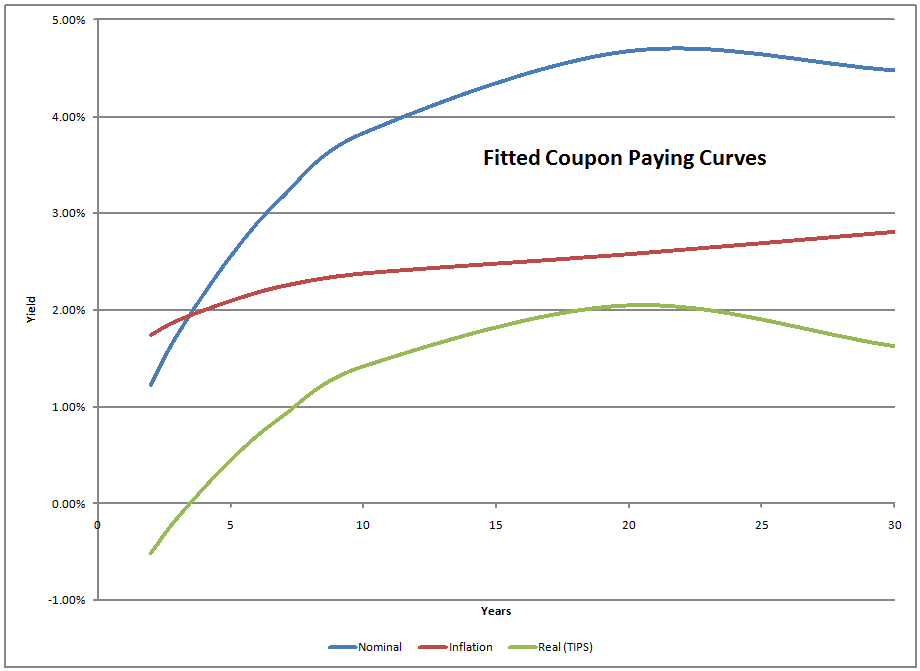Would that there were one time horizon — a goal to shoot for, similar to the dispensationalists that plague Christianity with an announced date for the return of Christ.? But a major reason that the Chicago School (as well as the Keynesians) is wrong in their view of economics is that there are multiple time horizons that people consider.
Why one time horizon?? It makes the math simple.? It is similar to the foolish Modern Portfolio Theory which has one version of risk which bears no resemblance to risk in the real world.? Modern Portfolio Theory exists so that bright people who can’t interpret the real world can receive salaries and look smart.? What’s that, you say, Modern Portfolio Theory has a fixed time horizon?? Another reason to cast it over the edge.? It is useless.
There have been a series of interviews at The New Yorker with Chicago School economists to try to test them in their allegiance to the free markets.? There is a problem here in that what makes sense in the short run does not always make sense in the long run.
Bubbles develop from short-run thinking.? What has worked in the immediate past? will work even better in the future.? In hindsight, it sounds dumb, but remember that most people are imitative; they imitate the seeming success of others.? People are rational, but not rational in the way that most economists posit.? Imitating your neighbor is a logical move for many actions.? If he is doing something that looks good, it can make a lot of sense to do the same thing — e.g., asking for the recipe for the delicious meal you had at their house, as well as asking where they got a certain obscure ingredient.
Imitation conserves on thinking.? People avoid thinking, because it hurts.? “If it works for my loser brother-in-law, than it certainly will work better for? me,” is the way some think.? There is the implicit appeal to taking an action out of greed or jealousy.? Smart people avoid those temptations, and think for themselves, looking to the long term consequences of any action.
Momentum investors live on the short-term horizon; value investors invest for the long term — if success comes quickly, very good, if slowly, good.? The ability to wait is a plus, because the ability to wait allows for optionality that may produce more value.
Back to bubbles.? They usually exist because financing is too cheap relative to what financing costs on average over a full market cycle.? Lending or equity investing at such times goes on with little thought for what can go wrong.
“This junk bond won’t default.”
“This equity will grow into its valuation, and then some.”
But near the peaks of bubbles, two things happen.? The prices of the assets being financed are so high, that one borrowing to own the asset faces a negative arb — he has to keep paying to keep the asset afloat — the net yield is negative.? The second thing is that chatter becomes uncertain, and the pace of closing deals slows.
These are signs that the cash flows that the assets throw off are less than the cash flows needed to hold the assets.? Such a condition can only exist for a short time during a mania.? When the pace of deals slackens, and the arb is negative it is time to run, not walk to the exits.
If enough economic actors did this, bubbles would self-deflate.? But it hurts to think.? Valuation questions are tough, and it is much easier to mimic the seemingly successful actions of others.
Better it would be if the Fed, which is the main blower of bubbles through easy monetary policy, would pull back on policy when aggregate levels of debt in the economy get above 200% of GDP, or, would allow us to go through recessions where there is significant pain, and liquidation of bad investments.? But no, during the bubble years, Greenspan was lionized for keeping the economy going smoothly — limiting the impact of recessions.? All that time, debts kept building up until the ratio far exceeded that achieved during the Great Depression.? Now Bernanke is lionized for increasing the Debt/GDP ratio while shifting debts from private to public hands.? He has saved us from the final reckoning of debt service.? Now what will the US Government do as its total obligations pass 4x GDP and head toward 5x GDP?? As I have said before, we are in uncharted waters here.
Debt is not neutral.? It creates inflexibility in the economy, because an economy built on fixed commitments has higher bankruptcy risks than one built on equity commitments.? Real reform would force banks to delever.? It would force the US Government to delever.? Real reform would get the government out of the prosperity business (it has never been good at that), and get it to focus on areas where it can make a difference — justice, defense, public health, and other public goods.
One simple solution: phase out the deduction for interest expenses, and phase in a deduction for dividends (preferred dividends would be at 50%).? Disallow trust preferred and hybrid debt structures.? Make finance more transparent by eliminating complex structures, and limiting all derivative transactions such that only hedgers may initiate transactions.? Transactions between two speculators should be regulated as gambling, because that is what it is.
If the government is not willing to take actions that hurt those being regulated, they are not worthy of being called a government.? The government should look out for the best interests of the nation as a whole, regardless of whom it might seem to favor.
Once again, back to bubbles.? Bubbles don’t get popped by the powers that be because the powers that be like bubbles as they are inflating.? Who would be a humbug and stop the sunbeam of prosperity when it is shining with full power?
But when the deflation of the bubble happens, everyone points the finger outward, few point at themselves.? Let Messrs. Greenspan, Paulson, Geithner, and Bernanke, among others, come before the cameras and apologize for their mismanagement of the US economy, and, let them suggest that the government get out of the economy business, because the government has consistently failed there.
To come back to the beginning of this article, the fetish of rationality exists in economics because the math doesn’t work without it.? Many tests of rationality have failed, yet the profession does not give up, because their skills are useless if man is not economically rational.
It is time to unemploy a lot of economists.? Unemploy them at the Fed; if we don’t eliminate the Fed, at least let’s slim it down.? Unemploy them at universities and colleges.? Let the business departments teach practical economics, and close the economics departments themselves.
The failure of Keynesian, Chicago School, and Neoclassical economics in this present crisis is severe.? We need a new economic paradigm to replace the failures that exist within our universities.
Neoclassical economics will fail; I may not live to see it fail, but it will fail.
.







